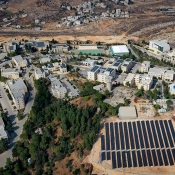Renowned researchers discuss realities, the quest for universal health coverage in the occupied Palestinian territories
The Institute of Community and Public Health at Birzeit University held a workshop to discuss the findings of a study on the path towards universal health coverage (UHC) in Palestine on Thursday, June 21, 2018.
The workshop, entitled “Who bears the burden of universal health coverage in Palestine? An assessment of alternative financing policies using an overlapping-generations general equilibrium model” – eponymously named after the research paper – featured two of the paper’s authors: Dr. Mohammad Abu-Zaineh and Sameera Awawda.
Abu-Zaineh, an associate professor and the INSERM-AMU Chair of Excellence in Health Economics and Policy at Aix-Marseille University, and Awawda, a Ph.D. candidate in Health Economics at Aix-Marseille University and research assistant at the Institute of Community and Public Health, discussed the findings of the paper, which revolved around the feasibility and sustainability of universal healthcare in the particular context of the occupied Palestinian territories.
In the paper, the authors show that an ad hocexpansion of the coverage of the population and health care costs may lead to a sizable fiscal deficit, indicating that universal healthcare (UHC) may not be sustainable, unless a fiscal consolidation policy is undertaken in the short-run. The authors addressed the questions of fiscal sustainability and intergenerational inequality of UHC-oriented reforms using a specifically-calibrated, overlapping-generations model within a general equilibrium framework (OLG-CGE) and applied microsimulation technique to evaluate alternative strategies to finance UHC, including deferred-debt-finance and current- and phased-manner finance policies.
From an economic perspective, among the policy options the authors examined, the current consumption taxation policy emerged as the best policy option in terms of its impact on fiscal sustainability and intergenerational inequalities. However, from a policy perspective, the capacity of governments to raise additional revenues might be constrained in the short-term. Under such circumstances, the authors indicate that deferred-debt finance may be preferred. In such a situation, policy-makers may have to trade-off fiscal sustainability against intergenerational inequality.
You can access the full text of the paper by clicking here.







